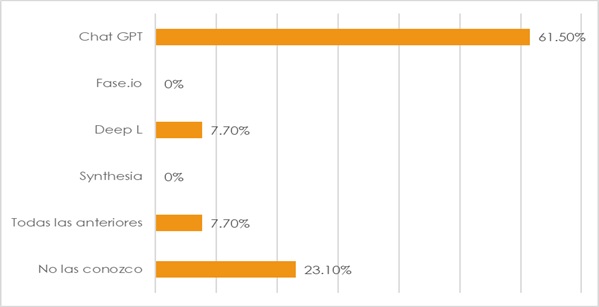Cómo Mejorar la Gestión del Conocimiento Mediante la Utilización de Herramientas de la Industria 5.0
DOI:
https://doi.org/10.17981/bilo.5.2.2023.01Keywords:
Industry 5.0, Quality Education, Virtual Learning EnvironmentsAbstract
With the emergence of Industry 5.0, virtual environments are booming because a process can be digitally represented in them as if it were something real. This concept is accompanied by technologies such as digital twins, the Internet of Things, and artificial intelligence. The industrial sector has seen the need to delve into digital tools for the most efficient, quick, and concise solution to problems. The development of technology is of utmost importance for modern industry, which is why they are looking for professionals who comply with quality education. Due to this, academic institutions should implement teaching strategies and actions to meet the competencies that companies need. In this paper, a background was analyzed about the three tools and their relationship with the improvement of knowledge, and a case study was analyzed to collect information on the implementation of Industry 5.0 by the students of higher education to guarantee an inclusive, equitable, and quality education and to become professionals with mastery of cutting-edge tools. The results show that most of the student population of the academic community analyzed is unaware of the tools of Industry 5.0; however, they consider that it would be beneficial for them to apply them in their academic preparation to obtain deeper and more updated learning
Downloads
References
P. Giner, C. Cetina, J. Fons y V. Pelechano, «Developing Mobile Workflow Support in the Internet of Things,» IEEE Pervasive Computing, pp. 18-26, 2010.
S. Badaró, L. J. Ibañez y M. J. Agüero, «Sistemas Expertos: Fundamentos, Metodologías y Aplicaciones,» Ciencia y Tecnología, vol. 13, pp. 349-364, 2013.
A. Troncoso Palacio, «El Modelado, la Simulación de Procesos y los Gemelos Digitales: Soporte para la Toma de Decisiones,» VirtualPro Procesos Industriales, nº 227, 2020.
C. Ruíz, B. Machay, N. Contero y L. Toca, «Lego Mindstorms EV3 en el proceso de enseñanza aprendizaje de programación básica,» Nexos Científicos, vol. 14, nº 2, pp. 13-26, 2020.
D. Yueyue, K. Zhang, S. Maharjan y Y. Zhang, «Deep Reinforcement Learning for Stochastic Computation Offloading in Digital Twin Networks,» IEEE Transactions on Industrial Informatics, vol. 17, 2020.
E. Yildiz, C. Moller y A. Bilberg, «Demonstration and evaluation of a digital twin-based virtual factory,» The International Journal of Advanced Manufacturing Technology, vol. 114, pp. 185-203, 2021.
D. Botín-Sanabria, A. S. Mihaita, R. Peimbert-García, M. Ramírez-Moreno, R. Ramírez-Mendoza y J. Lozoya-Santos, «Digital Twin Technology Challenges and Applications: A Comprehensive Review,» Remote Sens, vol. 14, nº 6, 2022.
A. Constantini, G. Di Modica, J. C. Ahouangonou, D. C. Duma, B. Martelli, M. Galletti, M. Antonacci, D. Nehls, P. Bellavista, C. Delamarre y D. Cesini, «IoTwins: Toward Implementation of Distributed Digital Twins in Industry 4.0 Settings,» Computers, vol. 11, nº 5, 2022.
D. Balderas, A. Ortiz, E. Méndez, P. Ponce y A. Molina, «Empowering Digital Twin for Industry 4.0 using metaheuristic optimization algorithms: case study PCB drilling optimization,» Int J Adv Manuf Technol, vol. 113, pp. 1295-1306, 2021.
K. Rose, S. Eldridge y L. Chapin, «La Internet de las Cosas-Una Breve Reseña,» Internet Society, 2015.
D. Evans, «Internet de las Cosas: Cómo la próxima evolución del internet lo cambia todo,» Cisco Internet Business Solutions Group (IBSG), 2011.
J. G. Corvalán, «Inteligencia Artificial y Derechos Humanos (Parte 1),» DPI CUÁNTICO, Buenos Aires, 2017.
J. M. Barrio Maestre, «Aspectos del Inacabamiento Humano. Observaciones desde la Antropología de la Educación,» Revista Española de Pedagogía, nº 200, pp. 75-103, 1995.
M. Leyva Vázquez, R. Escobar Jara, C. H. Espin Riofrio y K. Pérez Teruel, «Facebook para herramienta para el aprendizaje colaboratibo de la inteligencia artificial,» Dialnet, vol. 9, nº 1, pp. 27-36, 2018.
Universidad de la Sabana, «Campus Unisabana Portal de noticias,» 27 05 2019. [En línea]. Available: https://www.unisabana.edu.co/portaldenoticias/al-dia/la-inteligencia-artificial-ia-y-su-impacto-en-la-educacion/. [Último acceso: 12 07 2023]


 English
English
 Español (España)
Español (España)
